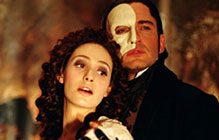|
|
|
|
The Phantom of the Opera
|
 |
|
Many
film critics – and I have been among them – proudly align themselves with the
cause of popular culture. This means that they passionately leap to the defence
of trashy comedies, outrageous melodramas or sensational action-horror
exercises. Usually implicit in such a stance is a profound identification with
the mass audience of “the people” and their immediate, unpretentious taste for
what is visceral and emotive.
Such
critics sitting among the target audience of Joel Schumacher’s film version of The Phantom of the Opera run the risk of
having to face an uncomfortable truth. The so-called pop culture that critics
tend to love is, finally, a rather intellectual, avant-garde, even sometimes elitist
construction – and, personally, I have very lttle trouble with that. Real popular culture, however, is the
middlebrow œuvre of Andrew Lloyd Webber – and it is a very, very bad thing
indeed.
Since
the early teenage experience of Joseph
and the Amazing Technicolor Dreamcoat (written in the late 1960s), I have
miraculously managed to avoid almost all contact with Webber’s peculiar brand
of pop artistry. This incarnation of his 1986 The Phantom of the Opera caught up with me like a slap in the face.
I have never felt so utterly alienated from the mass of average moviegoers as
during this endless, lifeless epic.
At
least it gave me the impetus to discover Gaston Leroux’s original novel.
Webber’s version is merely one in a long line of transformations of the basic
plot material. (Brian De Palma’s Phantom
of the Paradise [1974] remains, for me, unassailably the best.) The kernel
forever remains in place: the Phantom (Gerard Butler) is a disfigured composer
– regularly described as “a genius”, although it is hard to appreciate why –
who haunts the owners and staff of an opera house. His frustrated passion fixes
on the ingénue Christine (Emmy Rossum), who swiftly displaces the earthy diva
Carlotta (an amusing Minnie Driver) from front and centre of the stage.
Anyone
who takes on this story has rich material to work with, including the
design-concept of the Phantom’s subterranean, seemingly infinite lair, and a
range of diverse characters – including, here, the benevolent, all-knowing
Madame Giry (Miranda Richardson) and Christine’s wholesome beau, Raoul (Patrick
Wilson) – who have various, starkly different investments in the Phantom’s
fate.
But
do the theatrical productions of Webber’s Phantom maintain the same turgid rhythm as this movie? A slowly circling camera tracks
actors who might as well be walking underwater, singing songs that grind on
implacably. This triple layering of lethargy is truly unbearable, and makes the
film feel like a five-hour stretch.
Even
when songs in musicals halt the storyline, they usually open up an expansive lyrical
parenthesis for certain moods or emotions to be amplified and explored. In this Phantom, however, the mood is always
the same mushy, murky, faux-baroque fantasy – and one song is interchangeable
with the next. For Schumacher, this film marks a terrible decline since the lean,
earthy, inventive days of Amateur Night
at the Dixie Bar and Grill (1979) – and that‘s one piece of pop culture I do
strongly advise you to catch.
As
a screen musical, The Phantom of the
Opera is beset by the Broadway-inflicted tendency also evident in the weird
film version of Chicago (2002). Every
number has to be not only spectacular and show-stopping, but also, somehow, vaguely
ennobling – even when the subject of the song is vulgar, perverse or grotesque.
Most
of the scenes involving the Phantom himself fall into this less-than-noble
category. This so-called “Angel of Music” is a curious figure and,
symbolically, his relationship with Christine has a strongly incestuous
undertone. This is, indeed, the unsubtle subtext of horror master Dario Argento’s adaptation of Leroux’s novel in Il Fantasma dell’Opera (1998). That
director intensely identified with the “unrecognised genius” of the Phantom,
and cast his famous daughter, Asia Argento, as the leading lady.
The
Schumacher/Webber version, however, seemingly has no clue as to how to handle
this intriguing psychosexual hint, and proceeds in a state of implacable
denial. How else to explain the fact that Christine – after having almost
offered her body up to this Phantom who croons “Touch me, trust me” – later
rushes happily forth into a crypt to embrace this same man whom she now
believes to be the spirit of her father?
Nor
does this film have any idea what to with the social and historical dimensions
of the tale. During the worst song sequence, “Masquerade”, Schumacher briefly
mimics James Cameron’s Titanic (1997) – cutting away from the prim
bourgeoisie with their elegant masks to the lusty proletariat in the basement
enjoying a good, old knees-up.
But
no further trace of the real world intrudes, as this tragic romance crawls to
its morose, bathetic conclusion.
MORE Schumacher: Batman & Robin, Batman Forever, Phone Booth, D.C. Cab © Adrian Martin December 2004 |
![]()